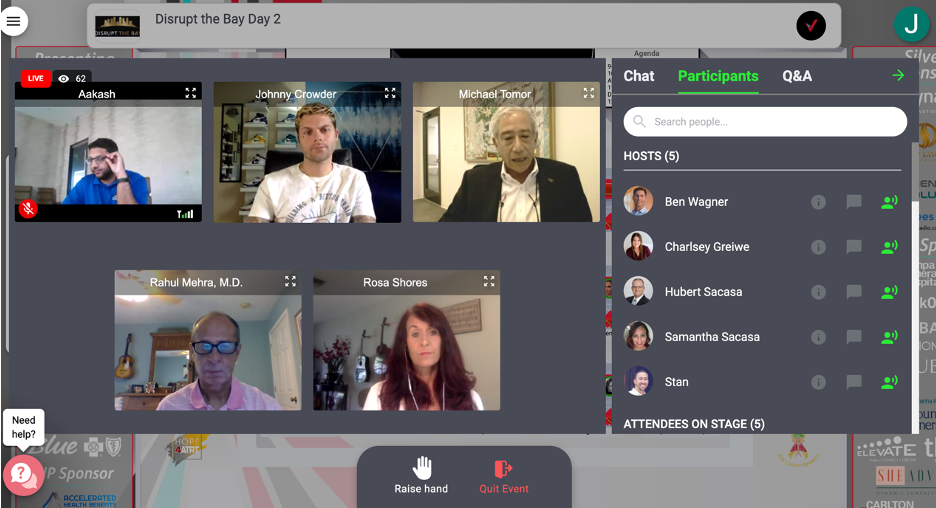
Disrupt the Bay Panel Discusses Mental Health
Mental health plays an important role in all of our lives, whether we know it or not. It is important to bring awareness to our community through education to help end the stigmas surrounding mental health. On day two of Disrupt the Bay’s virtual event on August 7th, President and CEO of Elevate Inc., Aakash Patel, led a mental health panel with panelists Johnny Crowder, Michael Tomor, Rahul N. Mehra, M.D., and Rose Shores. During this engaging discussion, each panelist gave their unique perspective on mental health topics.

Health care professionals are often taught to be reactive in treating their patients, rather than proactive. In terms of mental health, it is important to think about prevention, to help minimize the potential dangers that come along with mental health disorders. Panelist Rahul N. Mehra, M.D. of National Center for Performance Health is passionate about the impact education and conversations can have on the improvement of mental health treatments. Raising the topic of mental health in schools or work is important, especially when leading the discussion with the phrase “are you feeling stressed or anxious?” Asking an open-ended question puts less pressure on a group, and allows for an open discussion without any judgment. Dr. Mehra also suggests to chill out and turn social media off, with no more exposure than 15 minutes every day. When parents stress out about the media, particularly with recent events surrounding COVID-19, it can trickle down on their children, causing them to be stressed as well. It is important to approach situations with positive thoughts, and think in a problem-solving mindset. New medications and treatments are being brought into our community, but Dr. Mehra believes that we should address the lack of mental health awareness in our community, particularly education about suicide to help as many people as possible who may be suffering from mental health disorders in our community. Dr. Mehra works closely with the Children’s Home Network and finds other opportunities in the community to help out when it is needed.
Many patients who attend therapy are only able to do so around once a week. In-between their therapy sessions, patients can feel a gap that results in stress and frustration. CEO of Cope Notes, Johnny Crowder, created an innovative app that addresses this relevant problem in mental health. Cope Notes is an affordable way for patients to monitor their mental health on non-therapy days, and boost their self-esteem. Johnny believes that the concept of stress and frustration is universal, so it is important to address the problem as such. Regardless of culture, we need to focus on addressing a human condition rather than segmenting communities. A tip that Johnny finds helpful is to read books— during his schooling, he would read textbooks, and other books for leisure to supplement educational reading to figure out where his stress and identity issues were coming from and how to address them. Johnny is passionate about the NAMI (National Alliance on Mental Illnesses) organization and encourages anyone who is eager to become more educated on mental health to use their abundant resources. Businesses should work together, regardless of industry, to fill the gaps in our community, and help provide better mental health services for everyone.
Have you ever heard of art therapy? Executive Director of the Tampa Museum of Art, Michael Tomor, is proud of the art therapy program at the Tampa Bay Museum of Art, as it gives people an opportunity to express themselves in a way other than words or actions. The program offers a safe space for art to be interpreted in many different ways, without correction or judgment. People can look at works of art through the lens of their own life experiences, and share their thoughts with others in a supportive environment. Some people communicate better through a visual word rather than a written and spoken one— so it is important to offer a method of communication for everyone to help their mental health. The art program has been successful and has included partnerships with the University of South Florida and the University of Tampa to allow college students to learn in an active environment by moderating different classes. Although Michael says we have a long way to go in mental health treatments, it is necessary to have open communication about mental health and educate those around us to help excel the movement forward in our community. Michael works alongside the Tampa By Foundation for Mental Health and is proud of the work they have been doing for mental health awareness in Tampa.
It is important to recognize patients who are diagnosed with chronic diseases or illnesses, such as Cancer or Coronavirus, and the impact that it can have on their mental health. Co-Founder of BlockSpaces, Rosa Shores, connects Blockchain, a next-generation database, to the healthcare industry. Blockchain allows data to be stored and kept unchanged, offering a secure database for important and private information. Patients who are struggling with chronic illnesses, especially minorities and those living in rural areas can be nervous about their treatment options and their transition of care from a hospital to their home can be documented using Blockchain. Rosa’s work with BlockSpaces has resulted in greater community involvement in technology related to mental health, with bills being passed to push initiatives forward and allowing people to work on the cutting-edge of technology. Rosa wants to collect data in a way that can lead to better outcomes for patients, and help the community focus on disparities in mental health concerning chronic illnesses.
Members of the community should start taking mental health into account and put it at the forefront of daily conversations. Especially during a pandemic, we can start to experience mental health symptoms of loneliness and frustration. Front line workers, who have never experienced mental health illnesses before have shown many symptoms of stress due to the tough situations that many are currently facing. We all need to look out for one another and come together to support an important mental health initiative.
Categorized in: Work
This post was written by Elevate, Inc.




Comments are closed here.